Related Research Articles
The Niger national football team represents Niger in international football through the Nigerien Football Federation, a member of Confederation of African Football (CAF). Niger plays in the colors of the flag of Niger, white, green and orange. Their nickname comes from the Dama gazelle, native to Niger, the Hausa name of which is Meyna or Ménas The Dama appears on their badge in the colors of the national flag.

Stade Général Seyni Kountché (SGSK) is a multi-purpose stadium in Niamey, Niger. Used for football matches, it is home to the Niger national football team, as well as Niger Premier League clubs Sahel SC, Olympic FC de Niamey, Zumunta AC and JS du Ténéré, as well as club competitions such as the Niger Cup. The venue is also sometimes used for rugby union. It is the largest stadium in Niamey, followed by the 10,000-capacity Stade municipal.
Football is the most popular sport in Niger, a nation of over 25 million.
The Cinema of Niger began in the 1940s with the ethnographical documentary of French director Jean Rouch, before growing to become one of the most active national film cultures in Francophone Africa in the 1960s-70s with the work of filmmakers such as Oumarou Ganda, Moustapha Alassane and Gatta Abdourahamne. The industry has slowed somewhat since the 1980s, though films continue to be made in the country, with notable directors of recent decades including Mahamane Bakabe, Inoussa Ousseini, Mariama Hima, Moustapha Diop and Rahmatou Keïta. Unlike neighbouring Nigeria, with its thriving Hausa and English-language film industries, most Nigerien films are made in French with Francophone countries as their major market, whilst action and light entertainment films from Nigeria or dubbed western films fill most Nigerien theatres.
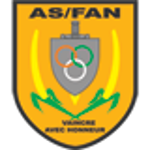
Association Sportive des Forces Armées Nigériennes or simply AS FAN is a Nigerien football club based in Niamey and operated by the Nigerien Armed Forces. They play at the stade du camp Bagagi Iya, a small stadium in one of Niamey's military bases, although larger matches are played at the stade Général Seyni Kountché. Their current club president is Army Lieutenant Colonel Djibrilla Hima Hamidou.
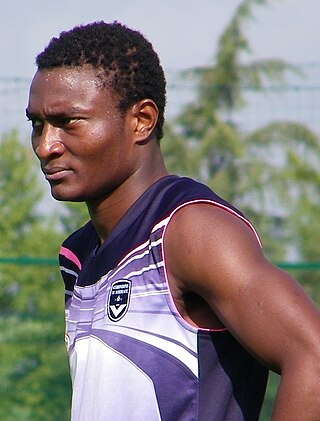
Ouwo Moussa Maâzou commonly known as Moussa Maâzou, is a Nigerien professional footballer who plays as a striker for Luxembourgish club FC The Belval Belvaux.
The Nigerien Basketball Federation(Fédération_Nigérienne_de_Basket-Ball / FENIBASKET) is the governing body for men's and women's basketball in Niger. FENIBASKET has been an affiliate of FIBA Africa since 1963 and its offices are located in Niamey. Its president is Djamila Ferdjani and its Secretary General is Saley Amadou Djingarey. Djamila Ferdjani, the first woman to hold the post, was elected in February 2009, following the retirement of Seini Yaye.

Parliamentary elections were held in Niger on 20 October 2009, after President Mamadou Tandja dissolved the National Assembly in May 2009 and a constitution referendum was held in August 2009. The elections were boycotted by most opposition parties, and saw Tandja's National Movement for the Society of Development (MNSD) win a landslide victory.
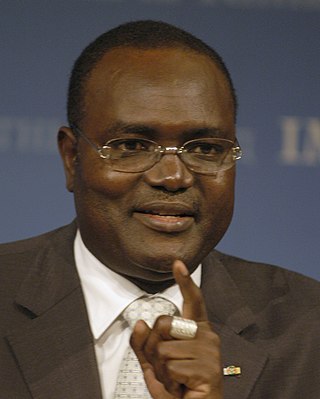
Ali Badjo Gamatié is a Nigerien politician and civil servant who served as Prime Minister of Niger from October 2009 to February 2010. He was Minister of Finance from 2000 to 2002 and then served as Vice-Governor of the Central Bank of West African States (BCEAO) before being appointed as prime minister by President Mamadou Tandja. Gamatié was prime minister for only a few months, however, as Tandja was overthrown in a February 2010 military coup.

Ousmane Issoufou Oubandawaki is a Nigerien politician. An engineer by profession, specializing in civil aviation, Oubandawaki held various posts at ASECNA and served in the government of Niger under President Ibrahim Baré Mainassara, first as Minister of National Defense from 1996 to 1997 and then as Minister of Transport from 1997 to 1998. He was Director-General of ASECNA from January 1999 to December 2004.
Issa Lamine is a Nigerien politician. He led the Toubou-based Front Democratique Revolutionnaire, one of several rebel groups operating in the far north and east of Niger in the late 1990s. Lamine entered government as a representative of the eastern town of N'Gourti in 2000. As a member of the Democratic and Social Convention (CDS-Rahama), he was a Deputy in the National Assembly of Niger and then served in the government of Niger as Minister of Public Health from 2007 to 2009. He left the CDS-Rahama in 2009 and was elected to the National Assembly as an independent candidate.
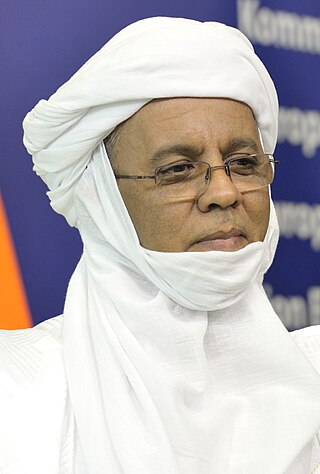
Brigi Rafini is a politician in Niger who served as the Prime Minister of Niger from 2011 to 2021. A native of Iférouane in Agadez Region and an ethnic Tuareg, Rafini was Minister of Agriculture in the late 1980s and Fourth Vice-President of the National Assembly of Niger from 2004 to 2009. He was appointed as prime minister after Mahamadou Issoufou took office as president on 7 April 2011. He is also notably the first Tuareg in office.

Karidjo Mahamadou is a Nigerien politician. A leading member of the Nigerien Party for Democracy and Socialism (PNDS-Tarayya), he served in the government of Niger as Minister of National Defense from 2011 to 2016. He has been President of the High Court of Justice since 2016.
Moussa Moumouni Djermakoye was a Nigerien politician who was President of the Nigerien Alliance for Democracy and Progress, a political party in Niger, from 2010 to 2017. As a high-ranking army officer, he was Army Chief of Staff for a time and also briefly served as Minister of National Defense in 1999 as part of a transitional military regime. After retiring from the army and beginning a political career, he stood as the ANDP's candidate in the 2011 presidential election, winning only a small share of the vote. From December 2011 to 2017, he was President of the Economic, Social and Cultural Council of Niger (CESOC).
Group C of the 2012 Africa Cup of Nations ran from 23 January until 31 January. It consisted of Gabon, Morocco, Niger and Tunisia. The matches were held in Gabon. Gabon and Tunisia progressed to the quarterfinals.
Djibril Moussa Souna is a Nigerien footballer. He currently plays as a defender for Nigerien side AS GNN. He is a member of Niger national football team, called at 2012 Africa Cup of Nations.
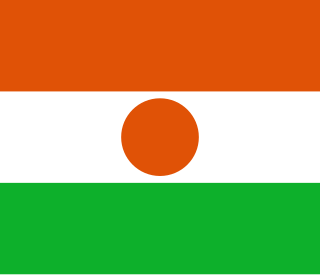
Niger competedwith six athletes in five sports at the 2012 Summer Olympics in London, held from 27 July to 12 August 2012. This was the nation's eleventh appearance at the Olympics, having competed at every Summer Olympics since 1964 with the exception of the 1976 Summer Olympics in Montreal, and the 1980 Summer Olympics in Moscow because of the African and the United States boycotts.

Nigeria Olympic Games competition is under the auspices of its Nigerien Olympic and National Sports Committee. From 2014 on, its president is Issaka Idé. A member of the Association of National Olympic Committees of Africa, the Niger committee was founded in 1964.
Djibrilla Hima Hamidou is a Nigerien military officer. He is known as "Pelé".
References
- ↑ "Niger - H. Doula - Profile with news, career statistics and history - Soccerway".
- ↑ FACTBOX-Soccer-Factbox on African Nations Cup finalists Niger. 2012-01-18, Reuters.
- 1 2 3 Présentation du trophée de Meilleur entraîneur africain obtenu par le sélectionneur du Mena : le ministre en charge des Sports décerne un témoignage officiel de satisfaction à Harouna Doula. 2012-01-03, Oumarou Moussa, Le Sahel.
- ↑ CHAN 2011: Niger Coach Harouna Doula Says His Side Is Not Under Pressure. 17 February 2011. Kingsley Kobo, Goal.
- ↑ CHAN 2011 : Un Niger héroïque mais éliminé par le Soudan - Football/CHAN 2011 - RFI 19 February 2011
- ↑ Conférence de presse, hier, de l'entraîneur du Mena, M. Harouna Doula : «Nous avons les moyens de faire un bon résultat, et nous irons pour faire un bon résultat à Freetown » Le Sahel
- ↑ "Niger in historic qualification despite Cairo loss". BBC Sport. British Broadcasting Corporation. 8 October 2011. Retrieved 8 October 2011.
- ↑ Fixtures, results and tables for the qualifiers for the 2012 Africa Cup of Nations to be co-hosted by Gabon and Equatorial Guinea. BBC Sport.
- ↑ CAN 2012 : le Niger se qualifie pour sa première phase finale - Football/CAN 2012 - RFI 8 October 2011
- ↑ CAN 2012 : le Nigérien Harouna Doula humble mais ambitieux - Football / CAN 2012 / Niger - RFI 9 January 2012
- ↑ Conférence de presse du président de la Fédération Nigérienne de Football (FENIFOOT) : "Il n'est pas question que le sélectionneur national quitte l'équipe", déclare le Colonel Djibrilla Hima Hamidou. 14 November 2011. Oumarou Moussa, Le Sahel.
- ↑ Conférence de presse du coach et du Capitaine du Mena National : 26 joueurs présélectionnés pour le stage de Douala au Cameroun 6 January 2012. Le Sahel.
- ↑ CAN 2012 : Rolland Courbis remplace Harouna Doula à la tête du Mena. 26 January 2012. Oumarou Moussa, Le Sahel.
- ↑ Tunisia nets winner in 90th minute Archived 24 September 2015 at the Wayback Machine . 27 January 2012. Associated Press.
- ↑ Niger : Pas de rivalité Courbis/Doula, selon le staff [ permanent dead link ]. 2012-01-27, ARP/EL Watan.